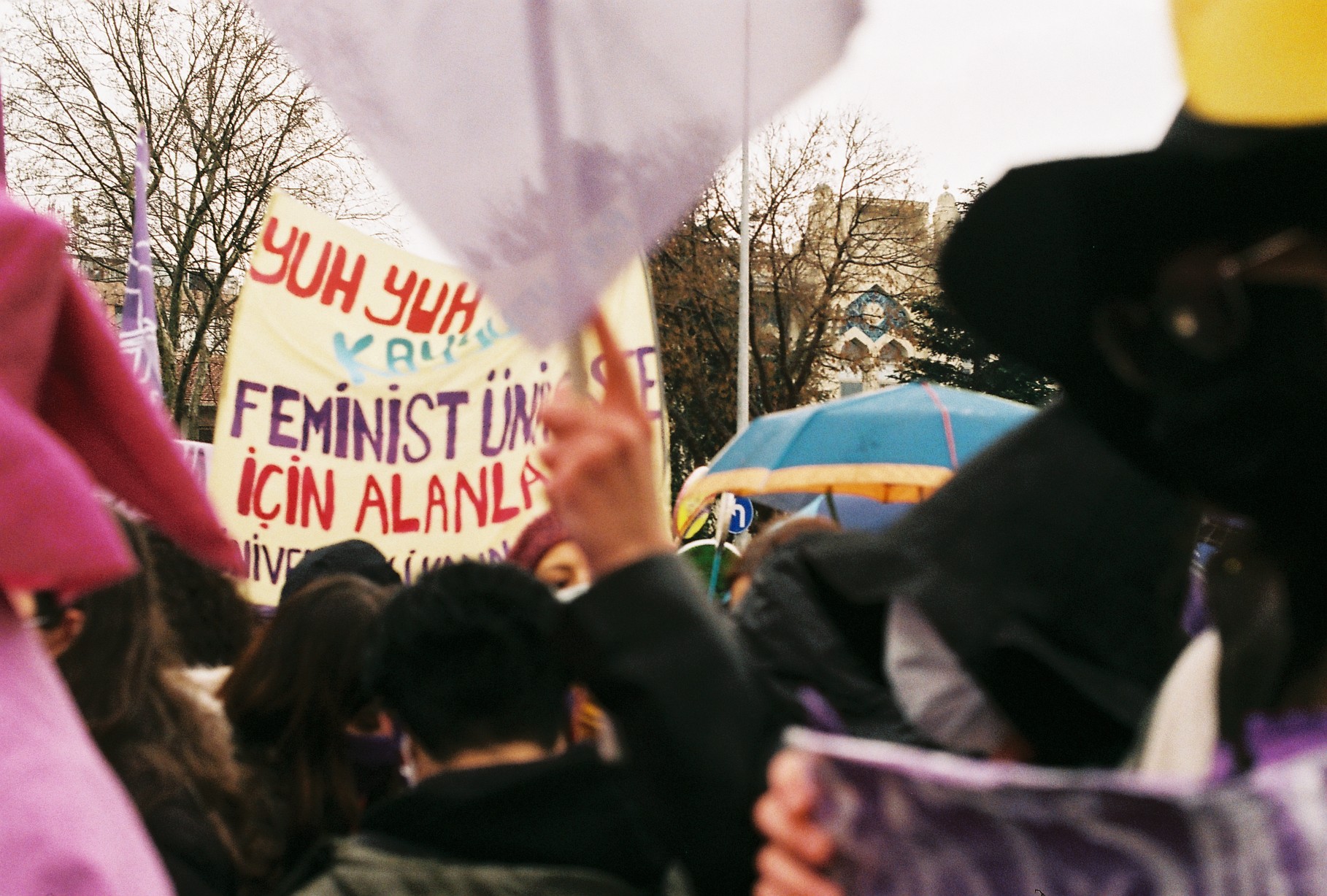Semi-Academic Pieces
Changing Politics of Abortion in Turkey
İdil Budak
Recently, abortion has been a topic that was focused and covered by many non-traditional, online, foreign or “alternative” newspapers in Turkey. One of the last pieces I came across when I was doing the research for the recent developments in terms of abortion in Turkey was a piece published by The Guardian in July 2022 with the headline “It was my right, but they refused’: Turkish women denied access to free, safe abortions”. Although this headline says it all and gave me the clue about the contradictory situation of abortion in Turkey, still I was wondering what is the legal and political situation of abortion and if needed do I really have access to this right of mine?
The contradiction is simple, abortion was legalized in 1983 and according to law, pregnancies can be terminated until the end of the tenth week. However, it is obstructed in practice. So, in this opinion paper I try to summarize and show how the increased anti-abortion rhetoric by the AKP government resulted in the practical changes in the implementation of abortion care as a women’s right.
Let me briefly talk about the emergence of abortion as a research and activism field across the globe.
The emergence of abortion as a concern of feminist and social science research happened in the 1960s which finds out that unsafe abortions were results of poverty, gender, and political inequality. It was the feminist activists and scholars who have questioned and emphasized the role of the state in women-related issues. These policies and practicalities included equal pay, equal work, free access to education, a broader agenda in terms of women’s healthcare (such as abortion care and free/accessible contraception methods) and childcare policies. This period has been called “the feminist critique of the welfare state” (Williams 1997: 258). Of course, “the feminist critique of the welfare state” came with its own contradictions, for example: is it always positive if a state has too much power on policies that effect individuals? If we take women’s reproductive rights as an example of this debate, according to Elizabeth Wilson, while state intervention to such policies can be considered as “the state organization of domestic life”, something that is not necessarily wrong, according to Ehrenreich and English, the intervening role of the welfare state to such policies might overthrew women’s own expertise in an area about themselves, dominating women’s lives (Gillians 1997: 27). Which is what exactly happened in terms of Turkey and abortion.
However, in my opinion this should not mean that states are only categorized in either of these spectrums of being supportive or constraining. This is a dynamic relationship in which the state can change its position according to the public opinion, political inclinations of the time, or the dominant ideology infused by the ruling party through media discourses. In the following section, I will be discussing how the practical ban of abortion in Turkey is one of the examples of recent shifts in abortion governance in local, national, and transnational contexts that keep posing threats to women’s sexual and reproductive health and rights globally (Unnithan and Zordo 2018: 1).
Turkey’s abortion timeline:
Right after the foundation of the Republic of Turkey in 1923, according to Turkish Penal Code, ratified in 1926 abortion was considered a crime (Mıhçıkokur et al. 2014: 26). In the following years 1936 and 1953, with the amendments to this law while any attempts to prevent pregnancy was also considered as a crime, penalties for induced abortion were increased (ibid). According to a survey in 1959, 53% of maternal deaths were abortion-related, while abortion remained as an illegal practice (ibid). With the strong advocacy of prominent obstetricians and gynecologists, in 1965, a population law was enacted, enabling the sale and use of contraceptive methods(ibid). In the period after 1965, with the introduction of family planning, and the reduced pronatalist propaganda, reproductive health clinics were introduced, and the use of traditional and modern contraceptive methods spread (ibid). Between 1960s and 1970s, abortion was only possible only if women’s lives were at risk or if there was an unusual or unexpected condition that could affect the baby’s development (Foster et al. 2016:62). The result of this restriction was the common practice of unsafe abortions that heightened during this period (ibid). In 1983, with the abortion reform it became possible for women to get voluntary termination of pregnancy “without restriction as to reason” (Foster et al. 2016:62) According to this reform, in terms of a medical necessity, it is possible to induce abortion after ten weeks’ gestation, and this law is still in force today (Mıhçıkour et al. 2014: 27). In addition, according to 1983 law, for minors, there needs to be parental approval and if the person is married an additional document showing husband’s consent is needed (Article 13 of the “Rahim Tahliyesi ve Sterilizasyon Hizmetlerinin Yürütülmesi ve Denetlenmesine İlişkin Tüzük”).

Between 1980 and 1990, abortion saved many women’s lives and caused a “dramatic reduction in the maternal mortality ratio (Foster et al. 2016:62). As the number of induced abortions in public hospitals increased, in 1994, according to International Federation for Population Planning, Turkey and Greece were the two countries where abortion was comparatively higher than other European countries (ibid). Although the number of abortions in Turkey were relatively higher than other European countries, Hogan et al. find that between 1990 and 2008 the number of induced abortions went down steadily because of the increased use of modern contraceptive methods (Mıhçıokur et al. 2014: 27). In addition, despite of its legalization, due to high workload of ObGyn specialists and insufficient number of certified general practitioners only 20% of abortions were performed in public health facilities, and more than half of the abortions were carried out in private clinics or private hospitals (ibid).
So, while abortion kept being inaccessible for some women due to lack of finances, institutions or lack of trained ObGyn specialists, just around 2012, when the Ministry of Health became very much supportive of medical abortion methods. The “high-level politicians” such as then-Prime Minister Recep Tayyip Erdoğan started to initiate anti-abortion rhetoric and even went as further to say that “abortion amounted murder and was part of a sly plan to wipe this nation off the global stage”(Foster et al. 2016: 63).
After the AKP government’s anti-abortion campaign of 2012, there emerged new challenges for women who want to get abortion as it became much more politicized and harder to reach due to discoursal targeting by Prime Minister Erdoğan. For example, access to abortion pills was banned. Some NGOs reported that although there was not a legal or written policy change, a lot of abortions were de facto restricted, and there has been an unwillingness towards the provision of abortion by hospitals, ever since (Foster et al. 2016: 67).
According to women in Turkey, these changes are results of a variety of political and economic motivations. First, it is no coincidence that the ‘murder’ discourse on abortion heightened in 2012, when the AKP government had the mission of a pro-natalist policy, as Prime Minister Erdoğan kept underlining that he wished three children from every married couple. This pro-natalist mission of the AKP government was in line with their conservative ideology that revolved and developed around religion which cherished traditional family values and “the sacred nature of motherhood”.
Erdoğan’s anti-abortion stance is problematic in many ways. First, when he frames abortion as a crime, although there is not such a law existing, he is giving the idea to the public that whoever is involved with abortion is a criminal. On the institutional scale, the negative impact can be seen on the public sector scheme where family planning services, including abortion and contraceptive counseling were moved out, which made women pay for such services. For example, access to emergency contraception pills has become a real challenge for women due to increased prices. Women also voiced their concerns about getting an abortion at a public institution since the abortion documentation and familial notification made them forced to go to private clinics. This seems to be the intention of the AKP government when “demonizing abortion”.
According to Sedef Erkmen, the writer of “Abortion in Turkey: AKP and Biopolitics”, this trend cannot only be explained by population policies, rather takes its roots from AKP’s belief that using family values will make the AKP have more control over women. Feminist activists think the AKP government is not necessarily interested in the increase of the population but is using a pronatalist agenda to match with their conservative and religious ideology.
The current state of abortion in Turkey shows that the relationship between the state and women is still very much dependent on the multiplicity of social relations of power, in this case gender, class and sexuality, where women are positioned differently at different times. Besides the absurdity of the number of men talking about policies that effect mostly women just because they are “high politicians”, it is very dangerous that women are being eliminated from this discussion as main subjects and agents. As the Turkish state became more of a Leviathan in terms of their anti-abortion position, making it harder for many women to safely access abortion, women in Turkey create solidarity networks by listing doctors who still perform abortions, and distribute it among grassroots organizations. While the coverage of abortion as an issue takes place mostly in foreign press outlets, the international solidarity networks are following the issue closely and local associations such as Mor Çatı Vakfı is making efforts to aid and support women who are experiencing an unwanted pregnancy. Mor Çatı also reports that men can prevent women from accessing and using contraceptive information. Consequently, partners commit violence by controlling women’s fertility and public authorities who refuse to perform abortions deny the right to a safe, healthy, and accessible abortion.
So, it is necessary to repeat: Protection from pregnancy is not only the responsibility of women! Despite the AKP government’s policies on gendered bodies, it is solidarity among women that should be visibilized, strengthened and emphasized.
Newspaper Articles
Bianet (26 May, 2012): “Başbakan “Her Kürtaj Bir Uludere’dir” Dedi”.
Duvar English (August 16, 2020): “Abortion ‘practically banned in Turkey’”.
Hürriyet Daily News (2012, May 31): State to take care of babies born out of rape.
Womenonwaves.org (2012, July 16): “Turkey bans medicines used for safe abortion from pharmacy in move to further restrict access”
The Guardian (July 5, 2022): “It was my right, but they refused’: Turkish women denied access to free, safe abortions”.
Academic References
Badamchi, Devrim Kabasakal (2014): Abortion and Public Reason in Turkey: A Normative Evaluation of the Discourses of AKP and CHP, Turkish Studies, 15:1, 45-61, DOI: 10.1080/14683849.2014.890413
Foster, A.M. / MacFarlane, K.A. / O’Neil, M.L. / Tekdemir, D. / Çetin, E. & Bilgen, B. (2016): Politics, policies, pronatalism, and practice: availability and accessibility of abortion and reproductive health services in Turkey. Reproductive Health Matters, 24:48, 62-70, DOI: 10.1016/ j.rhm.2016.11.002
Mıhçıokur, S. / Akın, A. / Güçiz Doğan, B. & Özvarış, Ş.B. (2014): The unmet need for safe abortion in Turkey: a role for medical abortion and training of medical students. Reproductive Health Matters. 26-35, DOI: 10.1016/S0968-8080(14)43790-X
Pascall, Gillian (1997): Social Policy: A New Feminist Analysis. Routledge, NY
Rahim Tahliyesi ve Sterilizasyon Hizmetlerinin Yürütülmesi ve Denetlenmesine İlişkin Tüzük. Retrieved from:https://www.mevzuat.gov.tr/MevzuatMetin/2.5.837395.pdf on August 25, 2022
Unnithan, M. / de Zordo, S. (2018): Re-situating abortion: Bio-politics, global health and rights in neo-liberal times. Global Public Health. 1-5, DOI: 10.1080/17441692.2018.144527
Williams, Fiona (1997): Feminism and Social Policy (2nd ed.) In Robinson, Victoria (ed.) / Richardson, Diane (ed.): Women’s Studies. London: Macmillan Press, 258-281
Author

